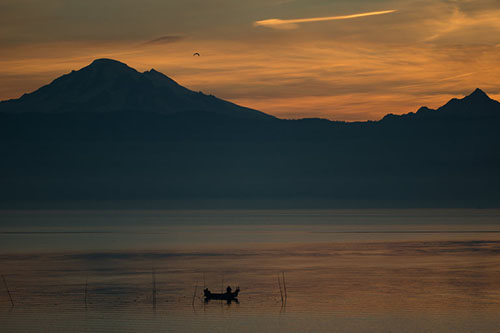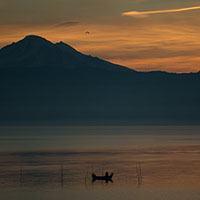— by Michael Riordan, updated May 12 at 9 a.m. —

A Lummi drift-net fisherman in the Salish Sea. Photo: Paul K. Anderson
In the end, after five arduous years of coal and controversy, it all came down to fish. On May 9 the US Army Corps of Engineers announced its findings that the Gateway Pacific Terminal could not be built and operated at Cherry Point without significant adverse impacts upon the treaty fishing rights of the Lummi Nation. Thus the Corps will have to abandon further permitting activities on the project.
This decision ends a back-and-forth debate that has been raging behind the scenes for over a year, beginning with a January 2015 letter to the Seattle office of the Corps from Lummi Business Council Chairman Tim Ballew II. In it he stated that the terminal could not be built without impacting tribal fishing rights and practices in the Cherry Point vicinity — also recognized by the Lummi as Xwe’chieXen after an ancestral village that was located nearby — and asked that the Corps terminate its efforts to evaluate and grant the permits needed for the project to proceed.
These rights were granted in the 1855 Treaty of Point Elliott, to which the Lummi tribe was a signatory, granting Indian tribes inalienable rights to continue fishing in their “usual and accustomed” fishing areas. Those rights were upheld by the landmark 1974 Boldt Decision, which was itself upheld five years later by the US Supreme Court. The text of the Boldt Decision specifically stated that Cherry Point waters are part of the Lummi Nation’s usual and accustomed fishing areas.
At the core of the debate between the Lummi Nation and terminal proposer SSA Marine was how serious the adverse impacts would be, and whether or not they could be mitigated by appropriate measures. SSA Marine contended that the waters off Cherry Point were not regularly fished by the Lummi, who refuted the claim with fisheries data from 1975 to 2014 and sworn statements by tribal fishermen.
SSA Marine also tried to claim that adverse impacts could be mitigated by such measures as providing areas for fishermen to drop crab pots from the back side of the piers. But Corps officials did not buy these (to this author, laughable) suggestions, and decided that the impacts would inevitably exceed the “de minimis” level that corresponds to the absence of legally significant impacts.
The Corps concentrated on physical impacts and obstructions imposed by the terminal piers and bulk carriers visiting the port. Little mention was made of the additional adverse impacts that the many tons of fugitive coal dust entering adjacent waters would have upon the environmental health of nearby Lummi fisheries.
In a 34-page decision memo released on May 9, Michelle Walker, Chief of the Corps Regulatory Branch said that “the Lummi’s direct evidence, tribal declarations and catch data, [provide] evidence the site is productive and regularly fished.” She concluded, “Based on the foregoing, there remain impacts to the Lummi’s exercise of fishing rights that I consider to be greater than de minimis.”
In a press release issued that day, Corps Seattle District Commander Col. John Buck stated: “I have . . . reviewed my staff’s determination that the Gateway Pacific Terminal would have a greater than de minimis impact on the Lummi Nation’s U&A rights, and I have determined the project is not permittable as currently proposed.”
The GPT project is thus effectively dead, because the Corps may not permit a project that abrogates Native American treaty rights.
Knowledgeable observers have already compared the project to the walking dead, given the recent collapse in the export market for coal. “This is like cutting the head off a zombie,” Clark Williams-Derry of the Sightline Institute told the Seattle Times. “It stopped making economic sense years ago, and now it’s officially dead.”
Whether the project could rise from the dead like the Biblical Lazarus depends on whether its proposers can stare into these stiff economic headwinds and still have the stomach to mount a costly legal challenge. That’s pretty unlikely, given that the coal companies backing this project, like mammoth Peabody Energy and Arch Coal, are now in bankruptcy court or about to enter it.
Terminal opponents are jubilant — and deeply grateful to the Lummi Nation for staunchly and unwaveringly leading the way in this five-year struggle.
Problems of fugitive dust, diesel fumes, and excessive noise from passing trains dominated mainland concerns. Islanders focused on underwater noise and spills from the 487 huge vessels that would have traversed our waters annually.
“This is a historic victory for treaty rights and the Constitution,” said Chairman Ballew in a statement. “It is a historic victory for the Lummi Nation and our entire region.”
**If you are reading theOrcasonian for free, thank your fellow islanders. If you would like to support theOrcasonian CLICK HERE to set your modestly-priced, voluntary subscription. Otherwise, no worries; we’re happy to share with you.**









Michael –
Thank you for the beautifully written article. Thank you and all the other islanders who have worked so hard for several years to fight the Gateway terminal and the other fossil fuel assaults to our waters.
Before we renew our efforts on confronting other proposals disastrous to our waters, it is time to truly celebrate!
Thanks for your kind words, Barbara,
You advice on legal issues during this long process proved invaluable and (along with others’ advice) helped me realize long ago that the Lummi Nation had the strongest case against this unfortunate coaldoggle. It proved to be exactly right.
Before celebrating on the the Gateway terminal being stopped worry on the Alberta tar sands being moved from Alberta and shipped through the Salish Sea.
I defer to Mike Riordan and his take on the the potential of this Project transpiring. The Alberta pipeline is not a done deal.
A number of Indian tribes are against the pipeline from Alberta to an island near Vancouver and then moved by large ships through our waters.
The tar sand shipping volume4 would have a major impact, even more so than a “coal spill”- tar sands are nasty stuff.
Thanks Mike Riordan for your efforts and info.